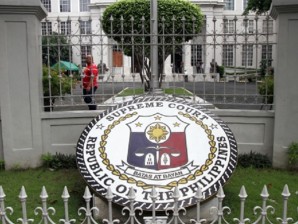MANILA, Philippines—The heart of Republic Act 10175 or the Cybercrime Prevention Act which is Section 12 or the Collection of Traffic Data is “barely constitutional,” government lawyers admitted before the Supreme Court Tuesday.
Section 12 of the law provides that “law enforcement authorities, with due cause, shall be authorized to collect or record by technical or electronic means traffic data in real-time associated with specified communications transmitted by means of a computer system.”
The same provision of the law provides that traffic data “refers only to the communication’s origin, destination, route, time, date, size, duration or type of underlying service but not content nor identities.”
High Court Justices asked what specifically is traffic data.
During the questioning of Senior Associate Justice Antonio Carpio, Solicitor-General Francis Jardeleza said traffic data could include private data. However, he said it cannot be considered violation of the right to privacy since no court has declared it private.
Carpio asked Jardeleza if for example a police officer tries to get a traffic data about him, will he raise the defense of privacy?
“I cannot argue privacy because the data on phone is external data therefore, that is not covered by privacy…Taking as instructive the experience in the US, in that jurisdiction, traffic data can be exercised if the trigger is a Federal State attorney,” Jardeleza said.
“But here any police can do it,” Carpio said.
“That is why my answer is it is constitutional but barely,” Jardeleza said.
Jardeleza added that collection of traffic data is allowed as long as there is “due cause.”
Carpio, together with Sereno, Associate Justices Teresita Leonardo De Castro, Mariano Del Castillo, Jose Perez asked what is due cause.
Jardeleza said “unfortunately, that is one of our misgivings under the law.”
“The law does not define what due cause means. Who will initiate the determination of due cause,” De Castro asked.
“You are right your honor,” Jardeleza said.
Sereno noted that Jardeleza himself demonstrated unease with Section 12.
“Section 12 grapples with due cause. What kind of animal is this and who will identify this animal…This section is the heart of the law, without this, this law is good for nothing,” Sereno said.
Without the Cybercrime Law, Carpio said, hacking can still be prosecuted under Republic Act 8792 or the E-Commerce Law.
“Even if we void this law, it is not a problem, hacker can still be penalized,” Carpio said.
The high court gave both the government and the anti-cybercrime law advocates 20 days to submit their memoranda.
However, extension of the restraining order on the implementation of the law will still be discussed by the court. The restraining order will expire on Feb. 5.
